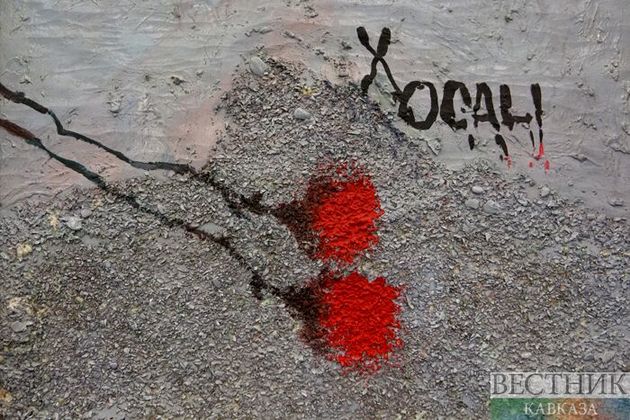On February 26, 1992, the nationalist illegal armed groups, which fought against the Republic of Azerbaijan, committed an act of genocide against the 7000 population of the Azerbaijani town of Khojaly.
As many as 613 people, including 63 children, 106 women and 70 old people were killed as a result of the massacre. A total of 1,000 civilians became disabled in the onslaught. Eight families were completely annihilated, 130 children lost one parent, while 25 lost both parents. Some 1,275 innocent residents were taken hostage, while the fate of 150 people still remains unknown.
All these acts were committed by Armenian military with extreme mercilessness and inconceivable barbarism. The second battalion of 366th regiment under the command of Major Seyran Ohanian, the third battalion under the command of Yevgeniy Nabokhin, staff chief of the first battalion Valeriy Chitchyan and more than 50 officers and ensigns took part in the attack.
On the 28th anniversary of the Khojaly events, Vestnik Kavkaza spoke with Russian cultural figures about the importance of preserving the memory of this crime against humanity.
The rector of the Boris Shchukin Theatre Institute, People's Artist of Russia Yevgeny Knyazev, stressed that the memory of the Khojaly tragedy should be preserved. "Of course, we know about this tragedy. How can we forget about those who have suffered such misfortune? If we forget about it, it will be unfair," he said.
"I can only express sympathy and regret to all those people who've been there, who have lost their relatives. I don’t understand how people can go to war against each other and destroy each other. People of all nations are good. Wherever you go, you meet wonderful people. Therefore, I want to tell everyone: come to your senses, let us live in peace, otherwise we will destroy ourselves," the rector of the Boris Shchukin Theatre Institute said.
The presenter of the intellectual TV programme for university entrants 'Geniuses and Wits', professor and writer Yuri Vyazemsky, agreed with Knyazev. "It’s absolutely necessary to remember these dates, they should be written in the brightest red letters in a sign of spilled human blood," he said.
"The fact that they shed so much blood in this beautiful and diverse corner of the Earth - the Caucasus - is a shame. It's a shame for everyone who participated in this even indirectly, who at least sympathized with it, because human life is the most valuable thing, and nothing can justify this - neither politics, nor national feelings, nothing. It’s necessary to understand that a person is a creation of God," Yuri Vyazemsky urged.
"For me, both Armenians and Azerbaijanis are wonderful people, certainly worthy of living on this land. Politicians who pursue their interests in conflicts need to learn one thing for sure: 'Do not incite hatred in any case.' And those who puts a finger on a trigger at a critical moment must remember that the most basic border is between a human and non-human," the professor emphasized.








